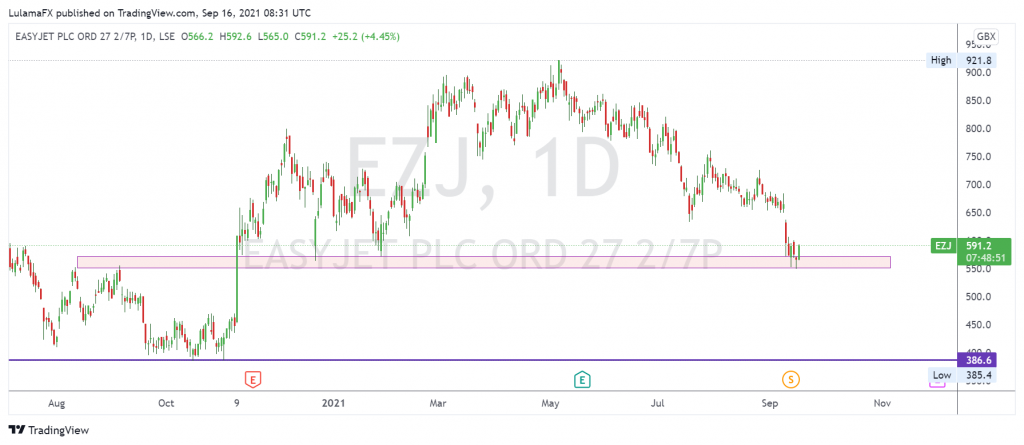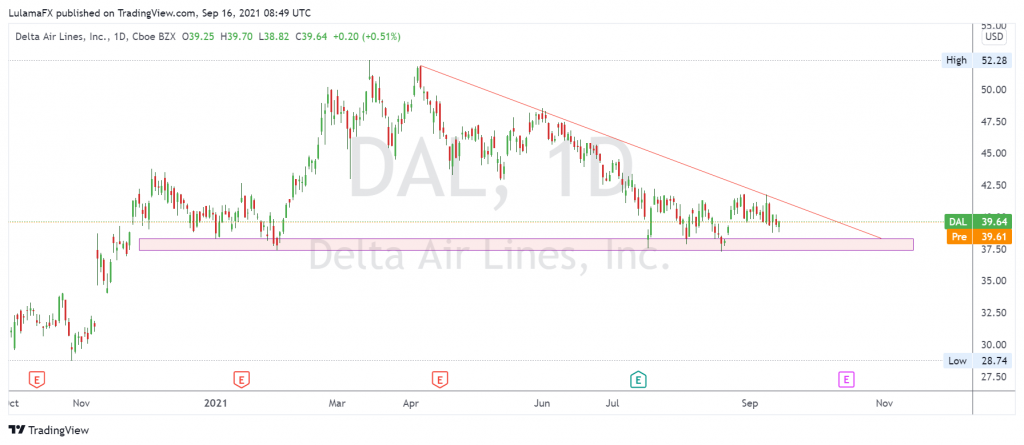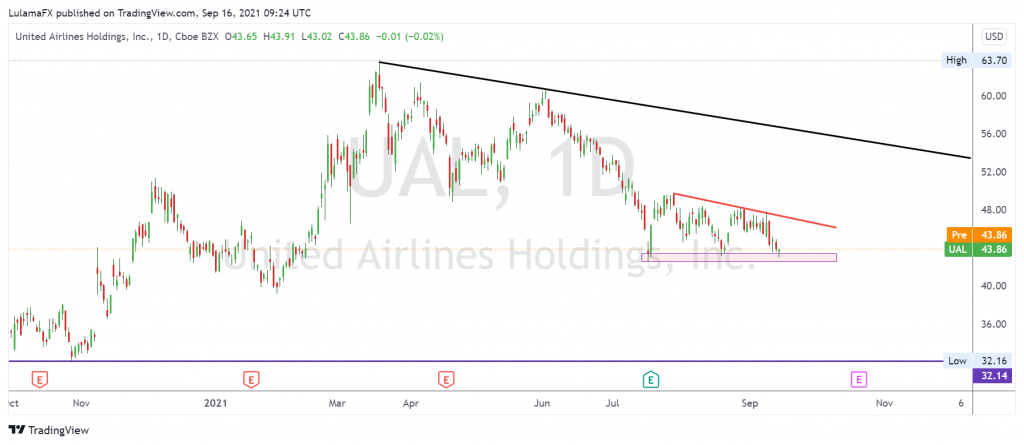Aviation stocks, buy mode amid the spread of delta variant

Table of Content
Key points
- The performance of the aviation stocks
- Airlines have not had a great run since the beginning of the pandemic
- Airline stocks outlook
- Conclusion
Aviation stocks have been having a rough run amid the spread of the delta variant in key countries such as the U.K and the U.S.A. The aviation stocks have seen been in the spotlight in the past 18-months as the pandemic has restricted the sector from pulling up the best performance and being one of the most hit sectors. The pandemic has brought losses to the sector rather than gains due to the lockdowns related to the pandemic and people have been restricted from travelling making it hard for aviation companies to make money.
Airlines were hit hard by the pandemic in 2020, but rebounded well in 2021, as vaccines alleviated people’s fear of travel, and suppressed holiday demand brought the crowd back to the airport this summer. We are far from normal, but investors have pushed up this year’s stock prices in the so-called “reopening of trading.” The investors have been betting on the mass vaccination programs and believe that the vaccine could help drive the demand for airline stocks and countries could well open their borders to allow people to travel to their holiday destinations. The key countries with the major economies have been pushing major vaccination but their effort has faced another challenge as the Delta variant and the possible fourth wave set to halt the plan to reopen the economy on a full scale.
First of all, these COVID19 themes are not surprising. Investors had expected that due to the Delta option, ticket sales would slow down, and the impact on the entire industry would be controllable compared to expectations. The forecast also shows that the airline’s recovery strategy worked at the beginning of the quarter before the number of daily new cases soared, which is good news for long-term shareholders.
If there is news that the White House will require all federal employees and millions of government contractors to be vaccinated against COVID19, the industry may also rise. The vaccinated population is the fastest and easiest way to end the pandemic, and the government’s normalization of vaccine regulations may make it easier for other employers to request vaccinations.
Aviation stocks outlook
EasyJet
EasyJet’s stock price went through a difficult run, and the stock fell to its January low. In the past 18 months, the aviation industry has been at the forefront of the impact of the pandemic, reporting a loss of 701 million pounds at the end of the first half of May. In July, EasyJet stated that the outlook for the third quarter did not look good because the airline stated that it expects its capacity in 2019 to account for only 15% of its capacity.
Facts have proved that the company flew 17% of its 2019 capacity in the third quarter, and its capacity was less than 20% for three consecutive quarters. However, this amounts to a loss of 318.3 million US dollars.
In the fourth quarter, the airline was more optimistic, expressing its intention to increase capacity to 60% of 2019 levels, especially on more popular routes.
At the time, EasyJet also stated that it paid an additional £122 million in customer refunds and vouchers worth 230 million pounds in the quarter.

In May, the airline announced that it has 2.9 billion pounds of working capital. However, as a sign that management hopes to survive a possibly difficult winter, EasyJet announced that it will return another $1.2 billion to the January low because shareholders need to spend more additional funds.
In the past 18 months, through various efforts to support its financial situation, since the beginning of the pandemic, the airline has raised more than 5.5 billion pounds. It also took the route of selling and leasing 43 aircraft to raise additional cash, although it apparently decided not to double its investment in this direction for the time being. It left an additional 141 wholly-owned and unused aircraft, which accounted for more than 40% of the remaining fleet.
DELTA AIRLINES
Delta Air Lines shares have been under pressure after recent relationships have indicated that the EU can reintroduce Coronavirus travel restrictions related to US travellers. UU The reason for this decision is the active propagation of the coronavirus delta variant in the United States UU as a result, the average US infection rate has exceeded the average EU infection rate.
The movement would be an important success to wait for the normalization of the global journey. The dissemination of the delta variant has already pressed a certain pressure on the sector. The actions of the airlines have moved lower from the beginning of June, and new developments can serve as an additional bearing catalyst.

In the coming weeks, traders may pay attention to delta variant spreads. Obviously, an increase in the delta variable will have an impact on the demand and travel decisions of other countries.
In this context, it remains to be seen whether Delta’s stock price can gain momentum in the short term. The company’s valuation is still attractive, but concerns related to the coronavirus may put more pressure on the stock. Due to the surge in Delta variants, the rebound in business travel and international travel may be delayed, and the stock needs to remain stable on the viral side to maintain a sustained upward trend.
UNITED AIRLINES
Due to concerns about the downturn in air travel demand, United Airlines (NASDAQ: UAL) stock fell in the fourth quarter as almost all aviation stocks. Although the continued surge in coronavirus cases due to the delta variant may cause short-term uncertainty, the long-term trend of the stock looks cheap. The ordering 270 aircraft from United Airlines may increase revenue and profit growth. Interestingly, the third round of payroll will support employees’ wages until September 30, and the number of passengers at the TSA checkpoint has not dropped significantly. With the relaxation of restrictions, the demand for air travel in the second quarter also increased-after the current surge, people hope that a similar trend will emerge.

UAL’s stock price has fallen to its January low, and as the company establishes a structure for the company’s way of development, it may seek to recover. Another reason for the decline in United’s share price may be that United Airlines recently announced that it will increase the number of recruits as the flight plan expands. With the US economy rebounding, this expanded flight schedule is a positive development. As people think the coronavirus pandemic is easing, the recent withdrawal has caused airline seat demand to rise again.
United also recently announced the expansion of its fleet.
Investors may also be cautious about the steps airlines must take to become more environmentally friendly.
Conclusion
Aviation stocks has recently been seeing a massive sell-off to the downside due to the spread of the delta variant. Despite the mass vaccination program, it has seen the sector is still faced with a big challenge ahead as more variant resurfaces and forcing countries to restrict travelling. It seems the aviation sector will take a long period until it starts seeing recovery. However, long term investors will be eyeing a long term pull back as soon as the sector starts to recover and aviation stocks are expected to recover.
Disclaimer: This material is a marketing communication and shall not in any case be construed as an investment advice, investment recommendation or presentation of an investment strategy. The marketing communication is prepared without taking into consideration the individual investors personal circumstances, investment experience or current financial situation. Any information contained therein in regardsto past performance or future forecasts does not constitute a reliable indicator of future performance, as circumstances may change over time. Scope Markets shall not accept any responsibility for any losses of investors due to the use and the content of the abovementioned information. Please note that forex trading and trading in other leveraged products involves a significant level of risk and is not suitable for all investors.







